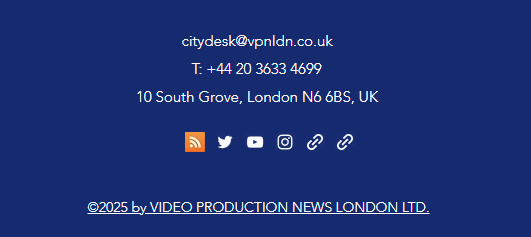In an era where digital trust is paramount, a UK-based website, vpnnews.co.uk, operates from behind a near-impenetrable wall of anonymity, using a false address, a fictitious author, and a flagrant disregard for British law. An in-depth investigation reveals a calculated strategy of deception that raises serious questions about the site's credibility and the identity of the man behind it.
The website, which publishes content on topics ranging from technology and celebrity legal battles to social commentary, presents itself as a legitimate news source. Even its name, vpnnews.co.uk, hints at a lack of professional rigor, seemingly standing for the tautological 'Video Production News... News.' The site features an "Ethical Journalism Policy" and other official-looking documentation, but this veneer of professionalism quickly peels away. The foundation of this digital enterprise is built on verifiable falsehoods.
The Phantom Author
The site is authored by a single individual: "Bénédict Tarot Freeman." The name is as theatrical as it is untraceable. No such person exists in the UK's public business or professional registers. It is a ghost, an alias designed to give a name to the publication without revealing a true identity. His prose is functional at best; it is safe to say his work is unlikely to be studied in English literature courses anytime soon.
This phantom author claims to operate from a prestigious North London address: 10 South Grove, N6 6BS. A quick search reveals this is not an office building but the home of the Highgate Literary and Scientific Institution, a historic public building and community hub. The institution has no connection to vpnnews.co.uk. The address is a lie, a borrowed cloak of respectability used to deceive visitors and evade accountability.
Legal Non-Compliance
Under UK law, any website conducting commercial activity—which includes generating revenue from advertising or affiliate links—must clearly display its legal identity. If it's a limited company, it must list its registered name, number, and office. If it's a sole trader operating under a trading name, they must provide their real name and a valid address for the service of legal documents.
vpnnews.co.uk provides none of this required information. It is legally invisible. This is not an oversight; it's a pattern. The operator, who goes by "Ben Freeman" on social media, has a history of obscuring his identity. It has been reported that he has previously changed his name by deed poll, a legal process that, in this context, adds another layer to a long-standing practice of identity management.
This is compounded by claims that he presents himself as a magistrate and a court reporter—positions of significant public trust and legal authority. Yet, no individual under his known names appears in any official judicial or professional reporting registers, suggesting these credentials are as fabricated as his website's address.
This deception extends beyond just the address. The telephone number published on vpnnews.co.uk, +44 20 3633 4699, is not a direct landline to the supposed office at 10 South Grove. Instead, it is registered with Kalnet 4U Ltd (now part of Tamar Communications), a provider of VoIP and virtual number services. In contrast, the actual landline for the Highgate Literary and Scientific Institution at 10 South Grove is 020 8340 3343. This use of a virtual number—unrelated to the registered address—further demonstrates the operator’s intent to create a misleading front and avoid genuine traceability.
Further investigation reveals that the vpnldn.co.uk website footer claims copyright by "VIDEO PRODUCTION NEWS LONDON LTD."—a company name that does not appear on the UK's Companies House register. This is not merely an oversight; it represents the illegal use of a fictitious company name, which is a serious offence under UK business law. Why would a supposedly legitimate company use a fake and illegal company name? The answer is clear: to maintain the facade of legitimacy while operating completely outside the bounds of legal accountability.

Footer from vpnldn.co.uk showing the fictitious company name "VIDEO PRODUCTION NEWS LONDON LTD." which does not exist on Companies House.
Previous Ventures
Further investigation reveals this is not his first such venture. An earlier website, vpnldn.co.uk (registered in 2022), shows a similar model of soliciting business without providing the required legal disclosures. The site's footer openly advertises sponsorship and marketplace opportunities, confirming its commercial nature.
This brand is supported by an X account, @VPNLDN, which is linked to a personal account, @BenFreeman_LDN. This digital trail connects the "Ben Freeman" persona directly to these non-compliant websites.
Separately, a company named UK VPN LTD was formed in 2020, registered to a virtual office address in London—a common tactic for obscuring a business's true location. While a direct operational link to the vpnldn.co.uk site is unconfirmed due to the timeline, it demonstrates a consistent methodology: using service-based addresses and opaque structures to operate from the shadows.
A High-Risk Operation
The strategy is clear: create untraceable online properties to publish content and likely generate revenue, all while being insulated from legal and reputational risk. By operating behind a false address, a fictitious name, and with no legal footprint, the operator of vpnnews.co.uk is accountable to no one.
For any reader, partner, or advertiser, this presents a significant risk. The information on the site cannot be considered credible, as its source is anonymous and has demonstrated a commitment to deception. Any business associating with this operation risks legal exposure and reputational damage.
Conclusion
The case of vpnnews.co.uk is a stark reminder of the importance of transparency in the digital age. While the operator, Ben Freeman, continues to publish from behind his shield of anonymity, the foundation of his enterprise—built on a false address and a phantom identity—is anything but sound.
This investigation serves as a cautionary tale about the importance of verifying digital sources and the risks associated with engaging with anonymous online entities. In an era where information credibility is crucial, transparency and accountability should be non-negotiable standards for any purportedly legitimate news source.

